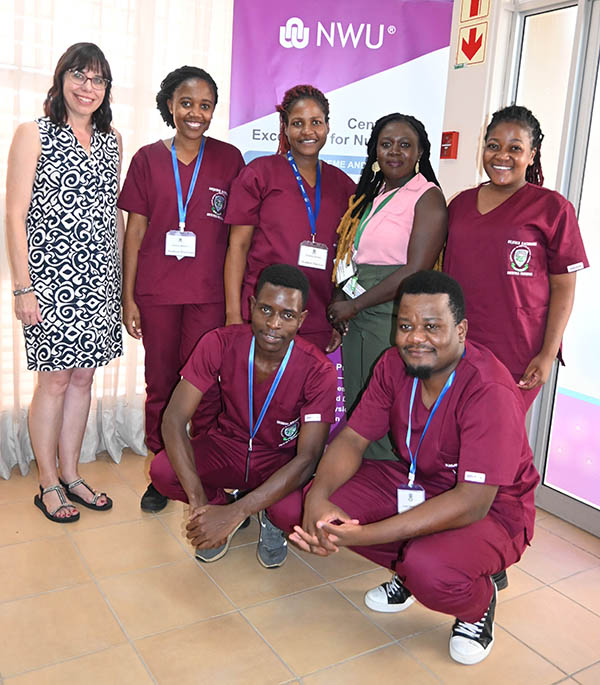It takes an expert team of doctors and nurses to ensure effective treatment for critically ill patients. A crucial addition to this team is a dietitian, as studies have shown that without the guidance of nutrition experts, many patients become malnourished while in hospital care.
The Dietetics Programme in the School of Applied Health Sciences at the North-West University (NWU) has many years of experience in training quality dietitians in South Africa.
A partnership between the NWU and the Lilongwe University of Agriculture and Natural Resources (LUANAR) in Malawi gives Malawian students the opportunity to gain much-needed practical exposure while completing their studies.
This collaboration is part of a memorandum of understanding (MoU) between the two institutions, enabling four cohorts of Malawian students to gain practical exposure in intensive care units at local hospitals in North West. These include the Potchefstroom Hospital, the Klerksdorp-Tshepong Tertiary Hospital and the Mediclinic.
Birth of a new dietetics network
Doris Nanga completed her master’s degree at the NWU before returning to Malawi and pursuing her career as a lecturer in Clinical Dietetics at LUANAR, where she is currently a postgraduate coordinator.
She says for many years Malawi did not train or have dietitians in hospitals. “We needed a programme that would contribute to establishing a workforce quicker than a full four-year programme.”
LUANAR developed a two-year Postgraduate Diploma in Hospital Dietetics to address this. Candidates who already have a basic qualification in nutrition or a BSc degree in Human Physiology can enrol for the postgraduate diploma, which focuses mainly on hospital dietetics.
The students complete the medical and paediatric blocks of their studies in Malawi, but the need was in the critical care block, which is a smaller part of the full programme.
This is where the NWU became involved. Doris reached out to her mentor, Prof Robin Dolman-Macleod, associate professor of and programme leader for Dietetics at the NWU. They discussed opportunities to enhance the training of Malawian dietitians.
This led to the signing of the MoU in 2022, with the first cohort of seven students visiting the NWU in January 2023 for eight weeks. This group graduated at the end of last year. The second group is currently busy with their practical exposure in South Africa, with the third and fourth cohorts joining in 2025 and 2026 respectively.
Essential skills to boost patient care
“They gain valuable skills in the provision of nutrition support to patients who cannot eat by themselves but depend on tube feeding or receiving nutrition directly into their veins.”
Doris says the students have the opportunity to work with a large range of patients, including premature babies, children and elderly people who have undergone surgery, motor vehicle accident victims, patients with burn injuries and critically ill diabetic patients, as well as cancer patients.
The programme is financed by the United States Agency for International Development (USAID) through the Nutrition for Health Activity, which is led by Dr Tinna Manani in the Faculty of Food and Human Sciences at LUANAR. The funds cover the costs of visas, flights, accommodation, food, transport and payment for local dietitians who help Doris and Prof Dolman-Macleod as dietetics preceptors (similar to mentors).
Doris hopes that the Malawian government will adopt the programme and possibly equip the hospitals in Malawi so that the programme can continue after 2026.
The immeasurable value of collaboration
According to Prof Dolman-Macleod, it is not only the practical exposure that is especially beneficial to students from both the NWU and Malawi. “The interaction between students is contributing to a bigger network of dietitians. We have seen with the first cohort that friendships and networking continue even when their studies have been completed.”
The NWU’s fourth-year students must spend 10 weeks in a hospital setting, with a few of these weeks focusing on critical care. Prof Dolman-Macleod and Doris arrange this practical component to coincide with the visit of the Malawian students, giving them the chance to interact and share experiences. This interaction also entails leadership development and various other activities.
“Our vision at the School of Applied Health Sciences and also at the NWU’s Centre of Excellence for Nutrition (CEN) is to develop scholars in nutrition in Africa. It is important to share our expertise and successes with other countries,” says Prof Dolman-Macleod. “This is a good example of where we have a great opportunity to achieve this aim.”

The second cohort of Malawian students from Lilongwe University of Agriculture and Natural Resources (LUANAR) visited the NWU in March 2023. They are in front Lusekero Mwandosya and Bongani Mkandawire. At the back are Prof Robin Dolman-Macleod, Anjawo Nyirenda, Christina Kandewu, Doris Nanga and Rejoice Kachingwe.
